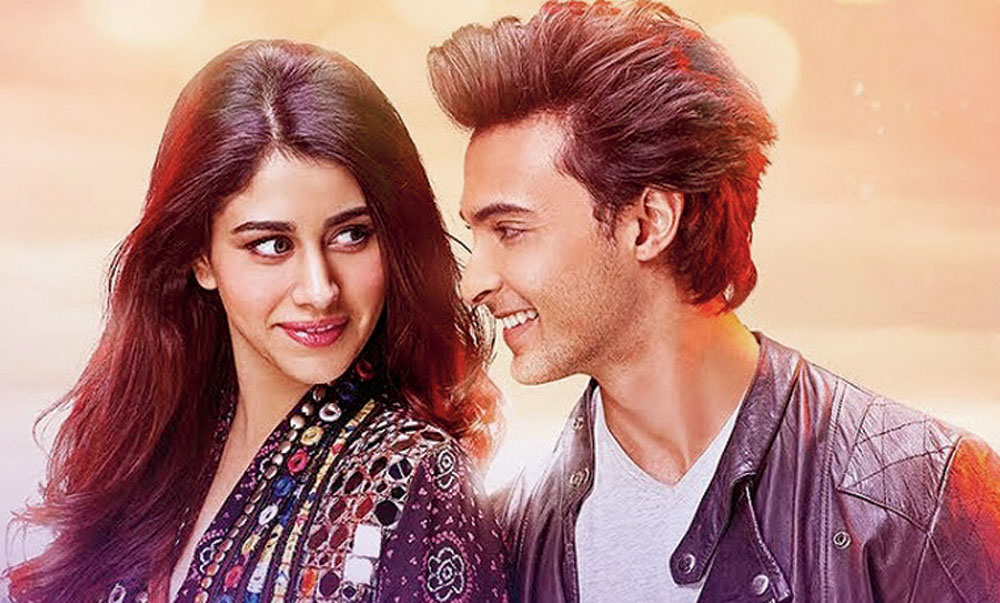There’s a scene in the second half of Loveyatri where Rasik Mama (Ram Kapoor) tries to cheer up his nephew Sushrut (Aayush Sharma) with a monologue about how Indian heroes do not give up on their love till the very end —citing examples of Aamir Khan in Qayamat Se Qayamat Tak, Shah Rukh Khan in Veer-Zaara and Salman Khan in Tere Naam. “That is how we love,” he says passionately, while all the firangs in the London pub stand there as transfixed spectators and cheer on. That’s just a small example of how outlandish Loveyatri is.
Sushrut aka Susu is a good-for-nothing college-going Gujarati lad in Vadodara, whose only aim is to open a garba academy one day. But how can you take the hero of a movie seriously who gets referred to as Susu by everyone with a straight face all through the film? The script by Niren Bhatt is peppered with dialogues such as —“Garba mein gol gol ghumte hai, par garba koi goal nahi” — when Susu tells his father about his aim.
Negative (Pratik Gandhi) and Rocket (Sajeel Parakh), as Susu’s friends, are far better than the lead himself. They’re the ones who make a scene watchable, while Sharma stands there with a one-tone expression. The friend called Negative — named so apparently because he’s a pessimist — is the only one who seems normal and is capable of logical thinking.
During Navratri, NRI college topper Michelle (who’s actually called Manisha) comes down to visit her relatives in Vadodara, with her dad Sam Patel (Ronit Roy). Patel owns a chain of laundromats in London called Lord of the Rinse and when he says he needs to go back soon, he’s told, “Tu yahaan nau din rahega toh kya wahaan London mein Queen ka ghagra maila ho jayega?”
There’s also a dialogue explaining that NRI girls cannot have local Indian street food without suffering from stomach ailments. Michelle even asks why he’s called Susu and he gives a whole background of how Sushrut was an Indian sage. Yawn!
Amidst such gem-like dialogues, love blossoms between Susu and Michelle while bonding over Vadodara food, garba and colourful costumes (by Alvira Agnihotri, Manish Malhotra and Ashley Rebello). Vaibhavi Merchant’s choreography and Tanishk Bagchi’s music ably support the garba fever.
Enter, a string of ’90s Hindi cinema cliches, like the girl’s rich dad brainwashing the hero, the heroine leaving for London all heartbroken and the hero realising his mistake, albeit too late. In the confrontation scene between Susu and Michelle at the restaurant, Sharma is so bad that you chuckle instead of feeling bad. With his floppy ’70s hero hairstyle and emotionless face, he offers little to root for him.
The second half is set entirely in London but by this time you have no interest left. Michelle makes Susu meet his friends in London and he mistakes Chris (Danny Mahoney) as her boyfriend (that’s what her evil dad had made Susu to believe back in Vadodara). Mahoney is actually a better actor than Sharma in the few scenes that he has with Hussain, and you do not really blame Michelle’s dad for being angry about his daughter’s questionable choice in men.
When Susu is falsely imprisoned by Michelle’s dad, he encounters two Gujarati cops in the London jail — Jignesh and Bhavesh — played by Sohail Khan and Arbaaz Khan. They let Susu escape Michelle’s dad with a warning: “Stop playing dirty games and let’s play garba.” In the end, everyone happily does garba with the London bridge in the background. And you’re happy the film’s finally ended.










